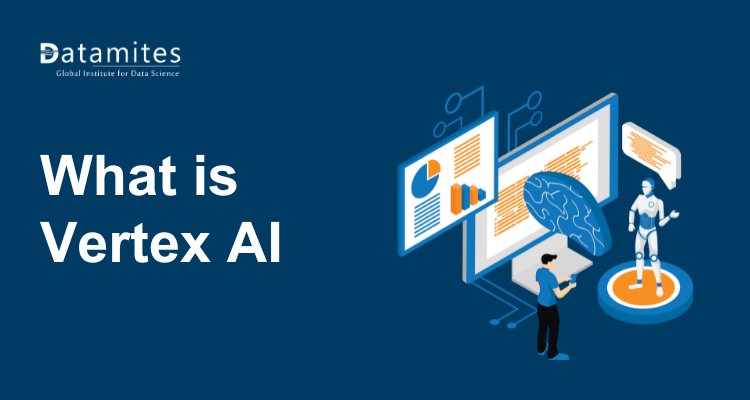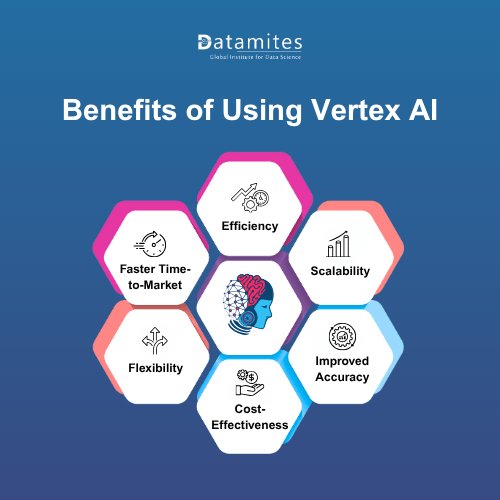What Is Vertex Artificial Intelligence?
Discover what Vertex Artificial Intelligence is and how it simplifies building, deploying, and managing machine learning models. Learn about its key features, benefits, and real-world applications for businesses.

Artificial Intelligence is no longer just a buzzword, it's the driving force behind innovations shaping our daily lives, from personalized recommendations on Netflix to advanced medical diagnostics. But while AI’s potential is massive, building and deploying machine learning models can be complex and time-consuming. This is where Vertex AI, Google Cloud’s cutting-edge AI platform, comes into play. Designed to simplify the entire machine learning journey, Vertex AI empowers businesses, developers, and data scientists to transform raw data into actionable intelligence faster and smarter. So, what exactly is Vertex Artificial Intelligence, and why is it becoming a game-changer in the AI world? Let’s dive in.
What is Vertex AI?
Vertex AI is a unified machine learning platform offered by Google Cloud that allows organizations to build, deploy, and scale AI models efficiently. Unlike traditional AI workflows that require multiple tools and extensive infrastructure, Vertex AI consolidates all aspects of the machine learning lifecycle into a single platform.
With Vertex AI, users can perform tasks such as data preparation, model training, evaluation, deployment, and monitoring all within an integrated environment. It supports popular frameworks like TensorFlow, PyTorch, and scikit-learn, making it flexible for diverse AI projects.
By leveraging Vertex AI, companies can accelerate their AI initiatives while reducing operational complexity and costs.
Key Features of Vertex AI
Vertex AI comes equipped with several powerful features that make it an ideal choice for enterprises looking to implement AI solutions:
- Unified ML Platform – Manage the entire machine learning lifecycle, from data ingestion to model deployment, in one platform.
- Pre-Built Models – Access ready-to-use models for tasks such as natural language processing, image recognition, and recommendation systems.
- Custom Model Training – Train custom models using your own datasets with support for popular ML frameworks.
- Model Deployment & Serving – Deploy models at scale with automatic scaling and low-latency predictions.
- Vertex Feature Store – Centralized storage for machine learning features, ensuring consistency and reusability across projects.
- AutoML Capabilities – Use automated machine learning to quickly generate high-performing models without deep expertise.
- End-to-End Monitoring – Track model performance, detect anomalies, and ensure AI solutions operate reliably in production.
These features position Vertex AI as a comprehensive machine learning platform suitable for both beginners and seasoned data scientists. According to ABI Research, the global Artificial Intelligence (AI) software market was valued at USD 122 billion in 2024. With a projected compound annual growth rate (CAGR) of 25%, the market is expected to surge to USD 467 billion by 2030, highlighting the rapid adoption and growing importance of AI solutions like Vertex AI.
Refer these below articles:
- What is Simple Linear Regression
- Python Libraries for Machine Learning
- Artificial Intelligence and Neural Network
How Vertex AI Works
Understanding how Vertex AI works is essential for organizations aiming to harness its full potential. Unlike traditional machine learning processes that require multiple tools and platforms, Vertex AI integrates the entire machine learning lifecycle into a single, streamlined environment. Here’s a breakdown of the key stages:
1. Data Preparation
The foundation of any AI model is quality data. With Vertex AI, you can import, clean, and prepare datasets directly within the platform. It provides robust tools for:
- Data labeling – Annotate images, text, and video data efficiently using manual or automated labeling features.
- Preprocessing – Handle missing values, normalize inputs, and apply feature engineering.
- Data transformation – Convert raw data into structured formats suitable for model training.
This reduces the time and effort required in preparing datasets while ensuring they are ready for machine learning tasks.
2. Model Training
Vertex AI gives users the flexibility to choose between pre-built algorithms or custom training:
- AutoML – Ideal for beginners, AutoML automates the training process, selecting the best architecture and hyperparameters.
- Custom Training – For advanced users, Vertex AI supports TensorFlow, PyTorch, and scikit-learn, allowing full control over model design.
- Distributed Training – Large datasets can be processed faster by leveraging Google Cloud’s infrastructure for parallelized training.
This means businesses can move from raw data to high-performing models in less time.
3. Evaluation
Once a model is trained, it must be validated. Vertex AI offers built-in evaluation metrics such as accuracy, precision, recall, and confusion matrices. These help users understand:
- How well the model is performing.
- Whether it is underfitting or overfitting.
- What adjustments may be needed for optimization.
This ensures models meet business requirements before being deployed into production.
4. Deployment
Vertex AI makes deployment seamless, enabling models to be served in different ways:
- Real-time predictions – Models can be deployed as APIs, providing instant responses to live data inputs.
- Batch predictions – For large datasets, models can process predictions in bulk efficiently.
- Automatic scaling – Google Cloud automatically manages resources, scaling up or down based on demand, which eliminates infrastructure headaches.
5. Monitoring & Management
One of the biggest challenges in machine learning is maintaining model performance over time. Vertex AI includes:
- Model Monitoring – Continuously tracks accuracy and detects concept drift (when input data changes over time).
- Alerts & Retraining – Triggers notifications when performance drops, allowing teams to retrain models promptly.
- Version Control – Manages different versions of models for easy rollback and auditing.
This proactive monitoring ensures models remain reliable and accurate in dynamic business environments.
Benefits of Using Vertex AI
Using Vertex AI offers numerous advantages for businesses and developers:
- Efficiency – Streamlines the machine learning lifecycle, saving time and reducing operational overhead.
- Scalability – Handles large-scale AI workloads with ease, supporting high-demand production environments.
- Flexibility – Works with various ML frameworks and allows for both pre-built and custom model development.
- Cost-Effectiveness – Minimizes infrastructure management costs by leveraging Google Cloud’s scalable resources.
- Improved Accuracy – AutoML and feature store capabilities enhance model performance and consistency.
- Faster Time-to-Market – Accelerates AI project deployment, enabling businesses to quickly leverage AI-driven insights.

Real-World Use Cases of Vertex AI
Vertex AI has been successfully adopted across multiple industries for diverse applications:
- Retail – Personalized product recommendations, inventory forecasting, and demand prediction.
- Healthcare – Medical image analysis, predictive diagnostics, and patient outcome prediction.
- Finance – Fraud detection, credit scoring, and automated trading strategies.
- Manufacturing – Predictive maintenance, quality control, and process optimization.
- Marketing – Customer segmentation, sentiment analysis, and campaign performance tracking.
These examples illustrate how Vertex AI empowers organizations to implement AI-driven solutions that improve efficiency, reduce costs, and enhance decision-making.
Read these below articles:
Vertex Artificial Intelligence is transforming the way businesses approach machine learning by providing an integrated, scalable, and efficient platform. From data preparation to model deployment, Vertex AI simplifies complex workflows, making it easier for organizations to adopt AI technologies.
Bengaluru, widely known as the “Silicon Valley of India,” is a thriving hub of technological innovation and growth. Pursuing an Artificial Intelligence course in Bengaluru can be a game-changer for your career, offering access to world-class education, hands-on training, and strong industry connections. With abundant networking opportunities and comprehensive career support, the city provides the perfect environment for aspiring AI professionals. Choosing to study AI in Bengaluru can unlock a wealth of career opportunities in this fast-evolving and highly rewarding field.
The DataMites Artificial Intelligence Course in Chennai delivers a well-structured training program tailored for both newcomers and seasoned professionals. The course emphasizes practical, hands-on learning with real-time projects, guided mentorship from industry experts, and strong placement assistance making it an excellent choice for those aiming to thrive in Chennai’s fast-growing tech landscape. Participants also receive globally recognized certifications from IABAC and NASSCOM FutureSkills, boosting their professional profile and opening doors to promising career opportunities in the competitive AI sector.
